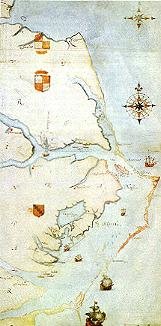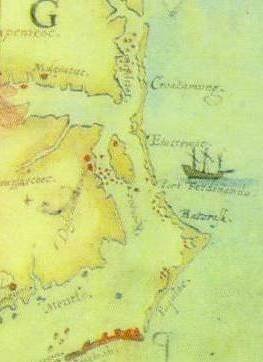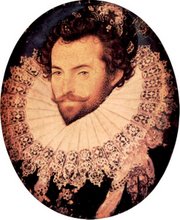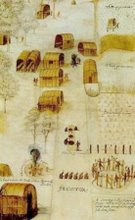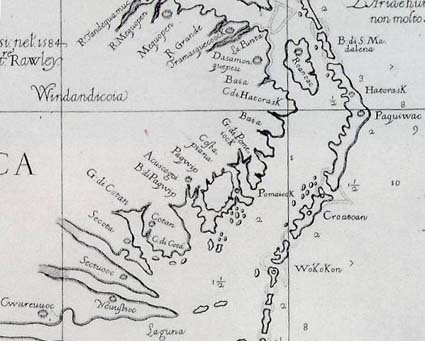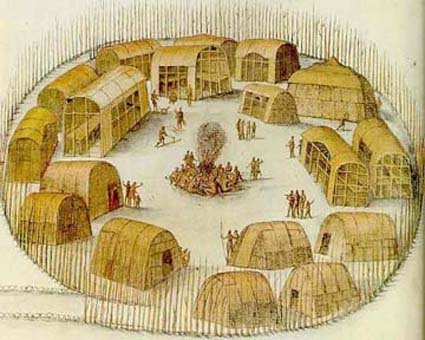Cartuca was the capital of the people whose ancestors were known to Raleigh's colonists as Croatans. That the people of King Tom Taylor of Cartuca were descended from members of the Lost Colony may be concluded from the Congressional Report of 1914-1915, by Special Indian Agent O.M. McPherson. It precluded their classification as "Native Americans," with the benefits they would derive from this status. Hugh and Clement Taylor were both members of the Lost colony, but it is not known which, if either, was an ancestor of King Taylor.
When John Lawson and Baron De Graffenried conspired and contracted for the settlement of Palatines in the geographically strategic site of Cartuca--now New Bern--in 1710, the people of King Taylor were pleased at the prospect of European neighbors. Their king was maternally descended from Sir Manteo (knighted Lord of Roanoake and Dasamonguepeuk by Queen Elizabeth) and an english adventurer named Taylor, and they were pleased at the prospect of European neighbors.
The Palatines, from the border electorate of European kings, between France and Germany, had other plans, however. They had no intentions of allowing the Indians to remain in the area of the junction of the Trent and Neuse Rivers. The site controlled heavy freight traffic to the land's interior. With a few well-placed cannons De Graffenried could control shipping there as surely as his ancestors (cousins to the English royalty) controlled the junction of the Neckar and the Rhine.
The sale of Cartuca (Core Tucka, the new Currituck)was a momentous event for the Indians. They saw it as the beginning of a new way of life for them. What sort of a new way of life was soon to become clear to them as the mysterious Corees, who became extinct.
On the night of the celebration of the sale of Cartuca to the whites, it became clear to King Taylor that John Lawson had bargained away far more than Taylor ever intended to sell. His first awareness of the real extent of his peoples' loss brought from him an eloquent plea for brotherhood and cooperation between the whites and the Indians, in the English dialect of the Raleigh colonists.
The unaccustomed spectacle of a savage in European clothing, presenting an impassioned plea for unity with the Europeans, was more than one of the Palatines could take. Michel, a geologist and mining expert, raging drunk on raw rum, jumped on King Taylor and pummeled him mercilessly.
Such behavior on such an occasion was inconceivable to the Indians. To even interrupt a tribal chief was a capitol offense, at the chief's discretion. Michel's brutality ended the festivities for the natives of Cartuca. When Michel was pulled from the battered and bleeding Taylor, John Lawson delivered an ultimatum to the Indians. They must immediately leave Cartuca--and the surrounding area!
The shock to the Indians was profound. The loss to them was suddenly clear. Their home, with its wattled Welsh peasant style houses was no longer theirs. They were expected to vacate Cartuca immediately!
After his painful humiliation before the assembly of whites and his people, King Taylor raged in drunken indignation and disbelief in his own cabin. He rambled on about his white ancestry. He spoke of the nobility of his Indian ancestors, and the appreciation shown to them by the Virgin Queen. And he moaned his grief that John Lawson and the Palatines were such ungracious subjects of a sovereign who succeeded her.
As King Taylor rambled on, loudly and bitterly, English settlers and their friendly Tuscarora neighbors from the Albemarle, who had come to the celebration of New Bern's founding, continued to carouse around the big bonfire with the Palatines. Each outburst of rage and frustration from Taylor's house brought a roar of raucous laughter from the wild gang around the fire.
Loudly some wag in the crowd pointed out to Michel that his English was not nearly so fine as that of King Taylor! Another pointed out that the beating Michel gave him only served to sharpen Taylor's tongue! At this, Michel jumped up, kicked a shower of burning embers from the fire, and vowed to kick as many sparks from the Indian leader's arsch!
Michel ran to Taylor's house, followed by the drunken mob that roared its approval, and kicked open the door. King Taylor was astonished to find his privacy so violated. As he rose to protest, the enraged German pounced on him. Michel again pummeled Taylor mercilessly, knocking him down. When the Indian chief struggled to rise, Michel slammed a boot to his body that kicked him out the door. That was the way King Taylor left his home in Cartuca.
The Indian leader sprawled unconscious in the dirt, as Michel ordered the other Indians from their home. The women of the Taylor household were allowed to hastily gather a few belongings, as the young Indian men picked up their battered father and erstwhile spokesman, of whom they had always been so proud. Then they vanished into the darkness, the way Indians always do.
This was really the opening battle of the Tuscarora War, of which John Lawson was the first officially documented victim. This was the opening battle of the war that pitted the Iroquoian Tuscaroras of Roquis Pocosin, who allied themselves with their English neighbors, against a hodge-podge of Sioux, Algonquins and renegade Iroquois (mostly Tuscaroras)--who saw their destinies prefigured in the disgraceful beating Taylor took. King Taylor--who had so prided himself on his English ancestry.....
Full Article Here:
http://www.dickshovel.com/coreewho.html
Monday, November 5, 2007
Descendants of the 'Lost Colonists' Forced to Flee Their Own Homes
Posted by
Historical Melungeons
at
11/05/2007 04:23:00 PM
![]()
Labels: colonies, crotoans, drake, England, indians, john lawson, Lumbee, manteo, Philip Amadas


